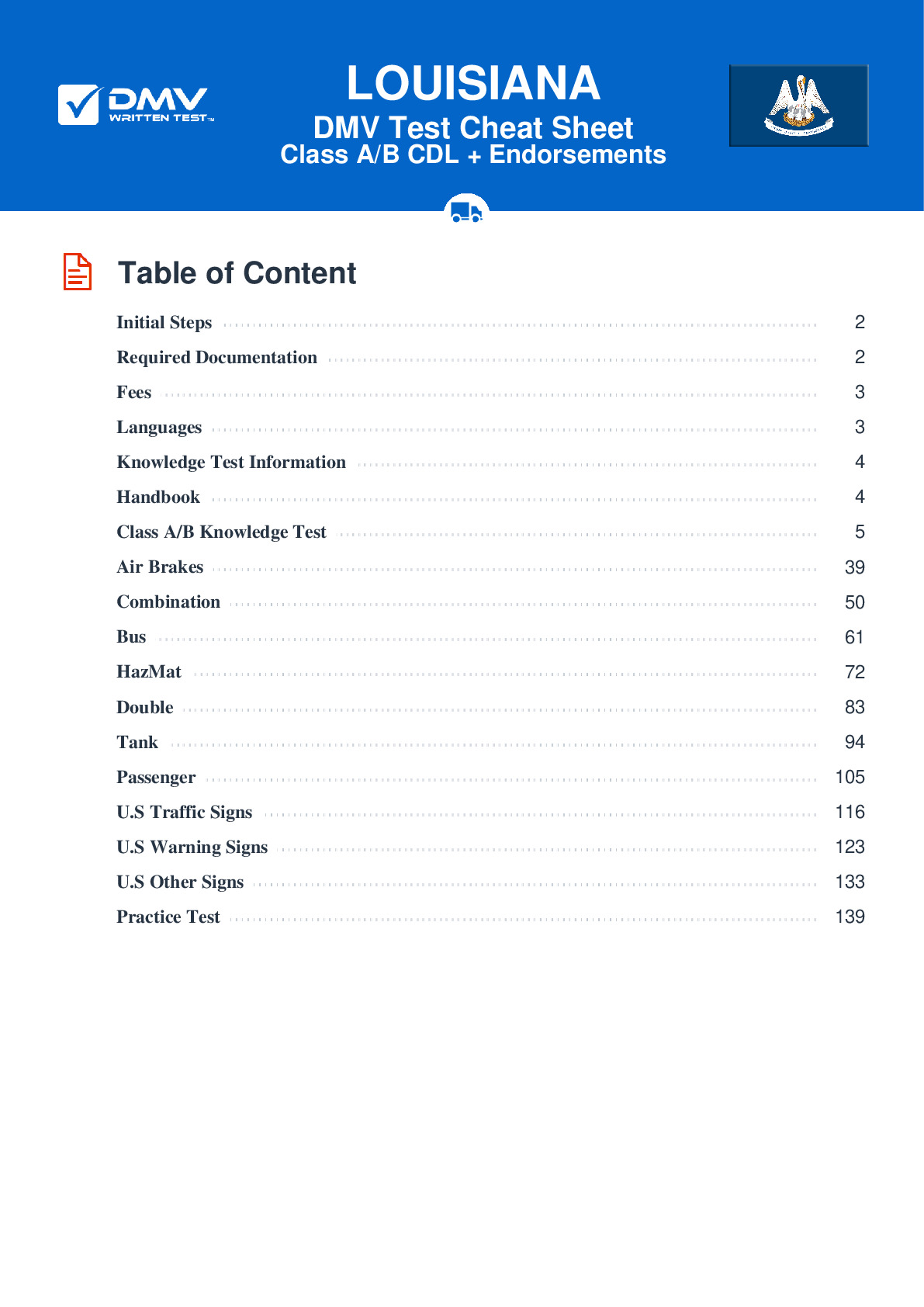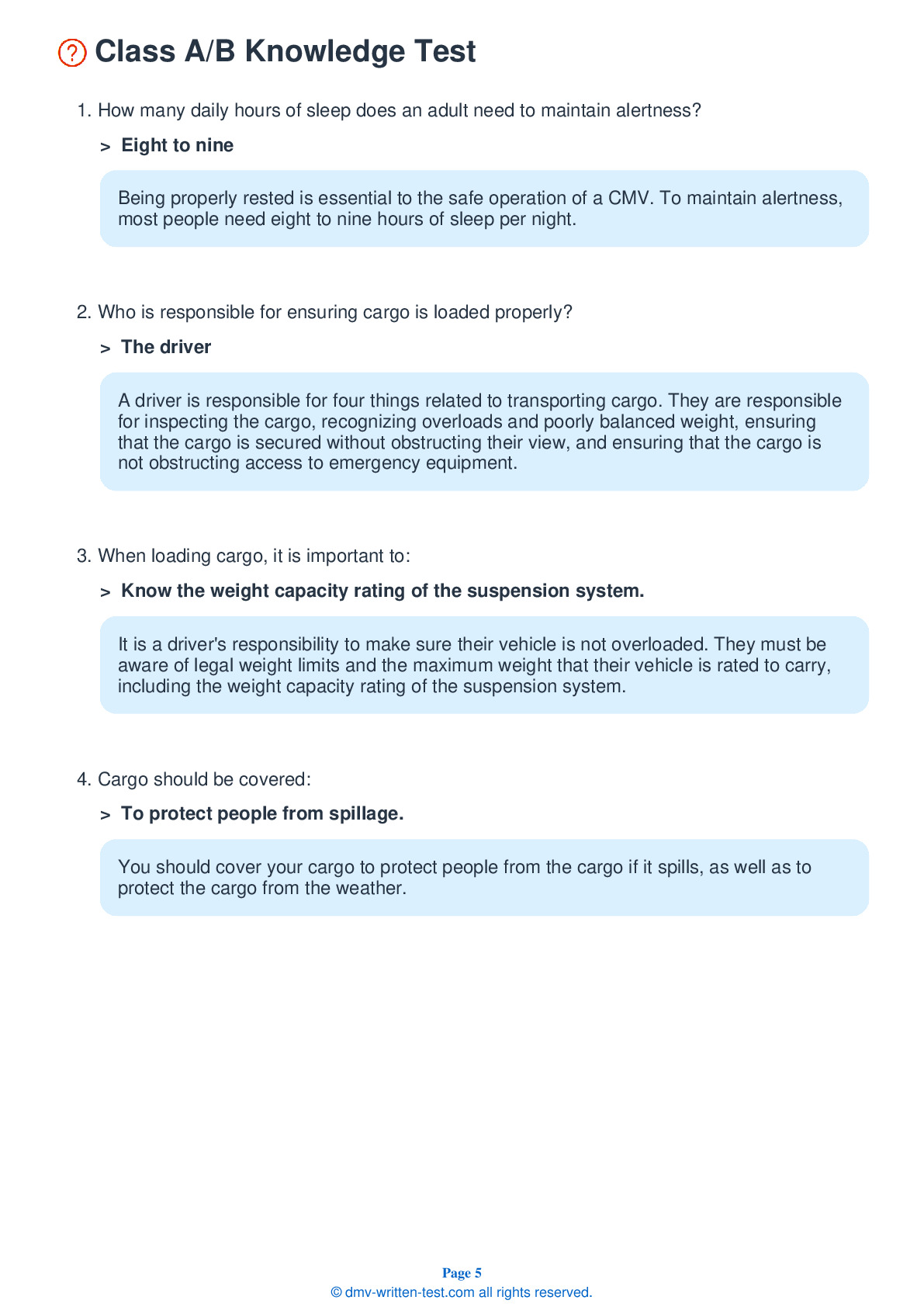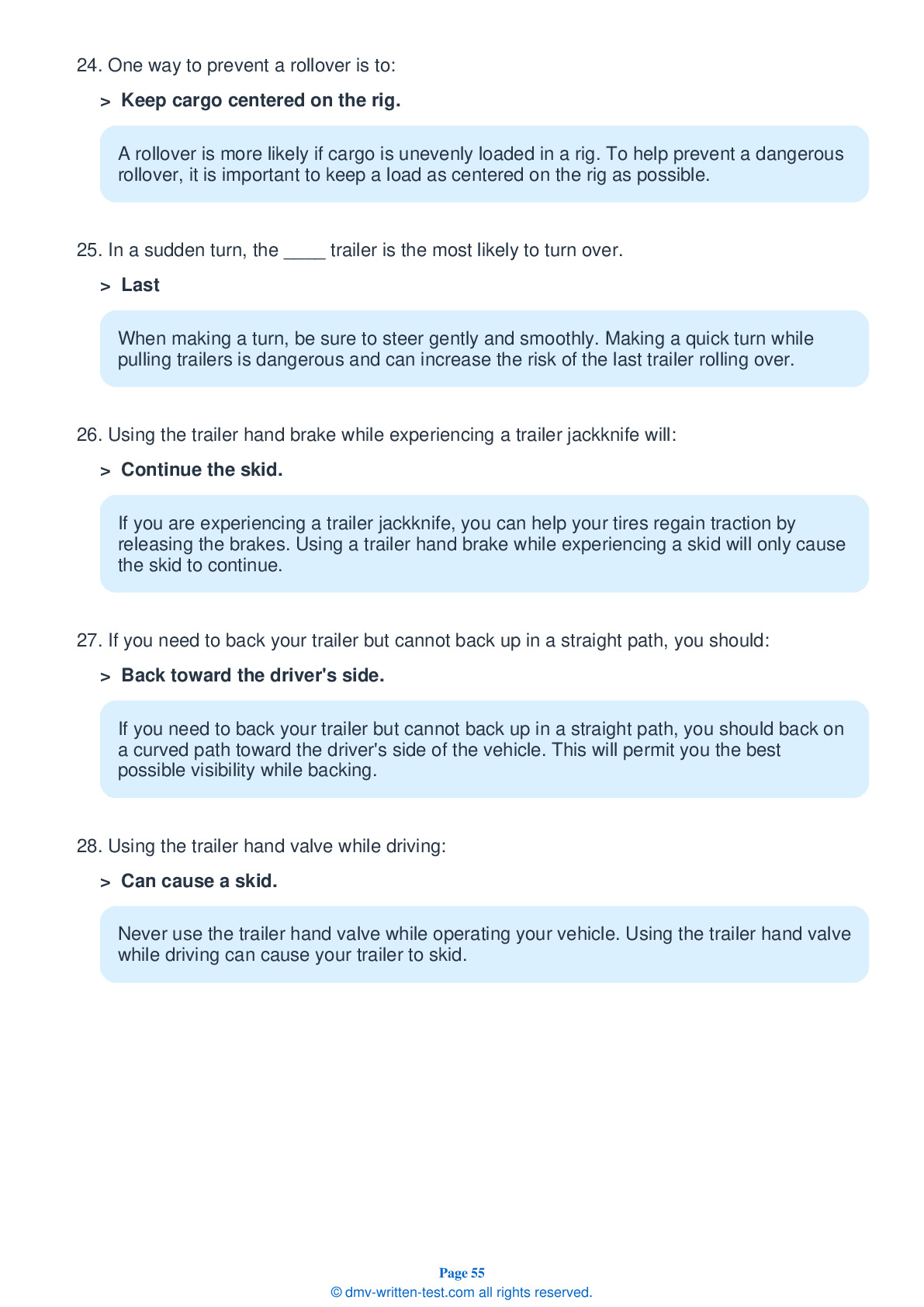Knowledge Test Class B
This license is required for driving a single vehicle with a GVWR of more than 26,001 pounds, and a trailer not to exceed 10,000 pounds gross vehicle weight rating, or a vehicle designed to transport 24 or more people (including the driver). To receive this license, applicants must pass a 50-question test. To pass, applicants must answer 40 questions correctly. Each question has three possible answer choices. Test questions come from the Louisiana Commercial Driver License Manual. Questions come from chapters covering: Introduction, Driving Safely, Air Brakes (if applicable), Pre-Trip Vehicle Inspection Test, Basic Vehicle Control Skills Test and On-Road Driving.. Endorsements that may be used with a Class B CDL are: Hazardous materials, Tank, Passenger, HazMat and Tank, Air Brakes and School bus.
8. When driving in fog, you should:
It is best not to avoid driving in fog. However, if you must drive under foggy conditions, be sure to decrease your speed.
9. A person driving with an open window in cold weather may be:
It is important to observe other drivers' actions and identify clues that a person could be driving impaired. Drivers who have had too much to drink, are sleepy, are on drugs, or are ill can present hazards to other drivers. One sign that a driver may be impaired is that they have their windows rolled down in cold weather.
10. If your vehicle is hydroplaning, you should:
If your vehicle begins to hydroplane, do not apply the brakes. Instead, slow down by releasing the accelerator and pushing in the clutch. This will help you to regain traction.
11. The steering wheel should be:
A steering wheel should be held firmly with both hands, placed on opposite sides of the wheel.
12. Skids happen when:
Skids happen when tires' traction with the road surface decreases. This can be caused by over-braking, over-accelerating, over-steering, and driving too fast.
13. Before attempting to put out an engine fire:
If you experience an engine fire, you should turn off the engine as soon as safely possible. Avoid opening the vehicle's hood when extinguishing the fire.
14. When backing with a trailer, turning toward the driver’s side is encouraged because:
When driving in reverse, it is always recommended that a driver backs their vehicle toward its left side. This will allow the driver the best possible view of the rear of their vehicle.
Frequently Asked Questions
Here are the steps to obtain a Class B CDL license in Louisiana:
1. Meet the eligibility requirements: You must be at least 18 years old and have a valid Louisiana driver's license.
2. Obtain a commercial learner's permit (CLP): To obtain a CLP, you will need to pass a written knowledge test and a vision test. You will also need to provide proper identification and pay the necessary fees.
3. Practice driving: Once you have your CLP, you must practice driving with a licensed CDL holder in the same class of vehicle you wish to operate.
4. Schedule a skills test: When you are ready, schedule a skills test with an approved third-party examiner.
5. Pass the skills test: The skills test consists of three parts - pre-trip inspection, basic vehicle control, and on-road driving. You must pass all three parts to obtain your CDL.
6. Submit required documentation: After passing the skills test, submit the necessary documentation and fees to obtain your CDL.
7. Maintain your CDL: To maintain your CDL, you must follow all state and federal regulations and meet any additional requirements for your specific job or employer.
Here are some examples of vehicles you can operate with a Class B CDL:
1. Straight trucks: This includes delivery trucks, dump trucks, and large tow trucks.
2. Buses: You can operate buses designed to transport 16 or more passengers (including the driver). This includes city buses, school buses, and commercial charter buses.
3. Box trucks with attached trailers: If the trailer weighs less than 10,000 pounds, you can operate a box truck with an attached trailer.
It is important to note that there may be endorsements required for certain types of vehicles or cargo. For example, you may need a hazardous materials endorsement to transport certain types of hazardous materials. Additionally, some employers may require additional training or certifications beyond what is required for a Class B CDL.
1. Age: You must be at least 18 years old to obtain a Class B CDL license.
2. Valid Louisiana driver's license: You must have a valid Louisiana driver's license.
3. Medical certification: You must pass a medical examination and obtain a medical certificate from a certified medical examiner. This certificate must be kept current and on file with the Louisiana Department of Public Safety and Corrections.
4. Knowledge test: You must pass a written knowledge test that covers topics such as vehicle inspection, safe driving practices, and transporting cargo.
5. Skills test: You must pass a three-part skills test consisting of a pre-trip inspection, basic vehicle control, and on-road driving test.
6. Commercial Learner's Permit (CLP): Before taking the skills test, you must hold a CLP for at least 14 days. To obtain a CLP, you must pass the knowledge test and meet other requirements such as submitting to a background check.
7. Fees: You must pay the appropriate fees for obtaining your Class B CDL license.
It is important to note that additional endorsements or certifications may be required for certain types of vehicles or cargo, such as hazardous materials or passenger endorsement for buses.
It's important to note that some employers may have their own age requirements that exceed the state's minimum age requirement. Additionally, younger drivers may face certain restrictions and limitations on the type of vehicles they can operate or the distance they can travel.
The most common endorsements for a Class B CDL are:
1. Passenger Endorsement (P): Required for drivers who plan to operate vehicles designed to transport 16 or more passengers, including the driver.
2. School Bus Endorsement (S): Required for drivers who plan to operate a school bus.
3. Tank Vehicle Endorsement (N): Required for drivers who plan to operate a tank vehicle that transports liquids or gases.
4. Hazardous Materials Endorsement (H): Required for drivers who plan to transport hazardous materials that require placarding.
To obtain these endorsements, you must pass additional knowledge and skills tests and meet other requirements, such as background checks and fingerprinting.
It's important to note that not all Class B CDL holders need endorsements, so it depends on what type of vehicle you plan to operate and what cargo you plan to transport.
1. Pre-trip inspection test: In this test, you will be asked to inspect your vehicle to make sure it is safe to operate. You will need to identify and explain the different parts of your vehicle, such as the engine compartment, brake system, steering system, and more.
2. Basic vehicle control skills test: In this test, you will be asked to demonstrate your ability to control your vehicle in a controlled environment. You will need to complete exercises such as straight line backing, offset backing to the left or right, and parallel parking.
3. On-road driving test: In this test, you will be evaluated while driving your vehicle on public roads with a DMV examiner. The examiner will evaluate your ability to safely drive your vehicle in traffic, follow traffic rules and signals, and perform basic maneuvers such as turning and merging.
It's important to note that each part of the skills test must be passed in order to obtain a Class B CDL license. Additionally, it's recommended that you complete a training program or take practice tests before attempting the skills test.
1. Vehicle weight: If you have a Class B CDL, you are allowed to operate vehicles with a gross vehicle weight rating (GVWR) of 26,001 pounds or more, but you cannot tow more than 10,000 pounds.
2. Passenger limits: If you have a Class B CDL with a passenger endorsement (P), you are allowed to transport up to 16 passengers, including the driver.
3. Hazardous materials: If you have a Class B CDL with a hazardous materials endorsement (H), you are allowed to transport hazardous materials, but you must comply with additional federal regulations such as placarding and labeling requirements.
4. School bus: If you have a Class B CDL with a school bus endorsement (S), you are allowed to operate school buses designed to transport 16 or more passengers.
5. Air brakes: If your vehicle has air brakes, you must pass an additional knowledge test and skills test to obtain an air brake endorsement.
It's important to note that these restrictions and limitations vary depending on the specific endorsements and licenses you hold. It's always best to check with your state's Department of Motor Vehicles for specific rules and regulations related to your license.
The Louisiana Office of Motor Vehicles (OMV) allows a translator to accompany you during the written test if you are unable to read or understand English. The translator must be at least 18 years old and cannot be a family member or anyone with a vested interest in the outcome of the test. The translator is not allowed to assist you with answering the questions or explaining the material in any way, but they can translate the questions and answers for you.
If you require a translator, it's important to let the OMV know when you schedule your test so they can make appropriate arrangements. Keep in mind that if you need a translator for the written test, you will also need one for the skills test and on-road driving test.
To request accommodations, you will need to submit a request form and supporting documentation to the OMV. The request form is available on the OMV's website or at any OMV office. You will need to provide documentation that verifies your disability and describes the specific accommodations you require.
Examples of possible accommodations include extended time for testing, a separate testing room, assistive technology or auxiliary aids such as a reader or sign language interpreter. The OMV will review your request and determine what accommodations are appropriate based on your specific needs.
It's important to note that you must submit your request for accommodations at least 30 days in advance of your scheduled test date to give the OMV enough time to provide the necessary accommodations.




